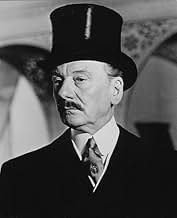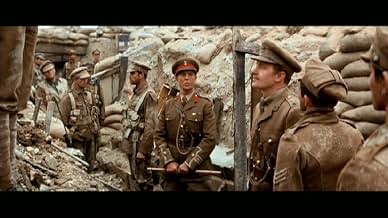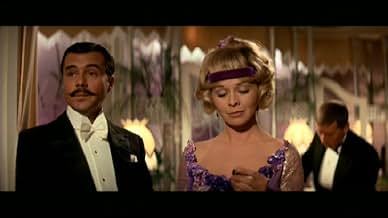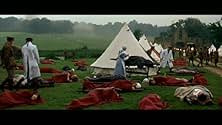The working-class Smiths change their initially sunny views on World War I after the three boys of the family witness the harsh reality of trench warfare.The working-class Smiths change their initially sunny views on World War I after the three boys of the family witness the harsh reality of trench warfare.The working-class Smiths change their initially sunny views on World War I after the three boys of the family witness the harsh reality of trench warfare.
- Director
- Writers
- Stars
- Won 6 BAFTA Awards
- 8 wins & 8 nominations total
- Director
- Writers
- All cast & crew
- Production, box office & more at IMDbPro
Featured reviews
In Flanders fields the poppies blow
Between the crosses, row by row,. . .
If yea break faith with us who die
We shall not sleep, though poppies grow
In Flanders fields
Anyway, shortly after WWI, in the early nineteen-twenties, the red poppy became the symbol of remembering and honoring the heroic dead. The day for remembrance became November 11, the date World War One ended. These days, I fear, most people in the United States think of November 11 not as "Remembrance Day" or "Armistice Day" but more as just Veteren's Day. It rarely even falls on November 11, and, when it does, most Americans view it simply as time off work.
As critic Roger Ebert once said, OH! WHAT A LOVELY WAR really isn't a movie at all, but a theatrical tableau. Like many a British muscial review, it contains little plot, much spirited music, and--in this case--the story of World War I. Some portions, as even director Richard Attenborough admitted, go on too long; however, so many other portions are just brilliant. Like other Attenborough movies, one hates to dislike it because its subject matter is so worthwhile and commands respect (will anyone do a remembrance film honoring the fallen dead of the present Iraqui conflict?) I know I gave it an 8, but I must say I don't quite know how to rate a movie like this one. There's nothing else in cinema like it.
It is all the more telling for its simplicity - none of the many great actors taking part delivers a weighty pronouncement on the evils - or otherwise - of war; it is enough to see the awful toll posted on the cricket scoreboard that keeps the daily tally of dead. The ordinariness of the Smith family, who lose every last one of their young men to the conflict, the cheerful patriotism of the proud families waving their loved ones off to war, and the stupid banalities of the officers who daily send their men out to be killed only serve to highlight the absolute futility and waste of WWI and all the wars that followed.
Scenes of upper class twits at play while their servants are dying to preserve their privileges; the officers' ball where military leaders try to score points off each other, concerned only with protocol and promotion; and the brilliant black humor of the outdoor church service are juxtaposed with scenes from the trenches as we watch the young men die one by one, all the more harrowing for their cheeky humor and fatalism.
Why this brilliant film has been allowed to sink without trace is baffling; I first saw it in the early seventies, and today it still has the same impact. And sadly, it is just as relevant now as it was then - a testimony to our inability to learn from our mistakes.
I saw it again 5 years later, in a revival house. I went with a high-school friend, happy to be able to introduce its power and brilliance to someone new. It blew her away completely.
That was 27 years ago, and I would give almost anything to know if the film could still move me as much as it did those first two times. It is not available on video, and I've never seen it broadcast on any TV channel.
This is truly one of those films that burned itself into my memory at first viewing. I urge anyone who finds the chance to see it to run, not walk, to the theatre! The Great War -- the War to End All Wars -- has faded deep into the past for most people, and we forget that the death-toll from that conflict blighted an entire generation. This film makes that loss all too vivid, using the music of the war itself.
Truly a classic, in the most literal sense of the word: a film for the ages.
Did you know
- TriviaThe song "La Chanson de Craonne" ("Adieu la Vie"), sung by Pia Colombo (Estaminet Singer) in this movie, commemorates a mutiny in 1917 by French troops. Merely singing it was considered an act of mutiny, and it was banned in France until 1974. During the war, a reward of one million francs and immediate honorable release from the Army was offered for the identity of the author, but never claimed.
- GoofsSir Edward Grey (Ralph Richardson) is shown early in the film being accompanied by his wife, described in the credits as Lady Pamela Grey. In fact, Grey did not marry Pamela (nee Wyndham, and the widow of Lord Glenconer) until 1922.
- Quotes
Soldier Singer: It was Christmas Day in the cookhouse, the happiest time of the year, Men's hearts were full of gladness and their bellies full of beer, When up popped Private Shorthouse, his face as bold as brass, He said We don't want your Christmas pudding, you can stick it up your... tidings of co-omfort and joy, comfort and joy, o-oh ti-idings of co-omfort and joy. It was Christmas Day in the harem, the eunuchs were standing 'round, And hundreds of beautiful women were stretched out on the ground, Along came the big bad Sultan, and gazed on his marble halls, He said Whaddya want for Christmas boys, and the eunuchs answered... tidings of co-omfort and joy, comfort and joy, o-oh ti-idings of comfort and joy.
- Crazy creditsOpening credits prologue: The principal statements made by the historical characters in this film are based on documentary evidence and the words of the songs are those sung by the troops during the First World War
- ConnectionsFeatured in Love Tory: A Film Portrait of Alan Clark (1993)
- SoundtracksOh, It's a Lovely War
(uncredited)
Written by John Long and Maurice Scott
Performed by John Mills and chorus
- How long is Oh! What a Lovely War?Powered by Alexa
Details
Box office
- Gross US & Canada
- $801,591




















